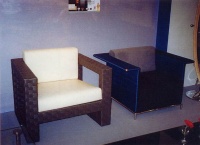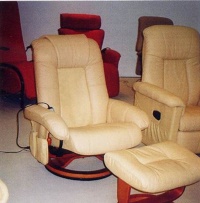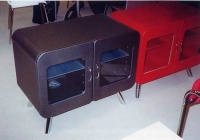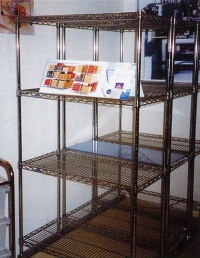Taiwan Firms Showcase Glass Furniture at IFFS2004
Jun 25, 2004 Ι Industry News Ι Furniture Ι By Philip, CENS
Taiwanese exhibitors caught the eye of buyers at the International Furniture Fair Singapore/ASEAN Furniture 2004 show, held on Mar. 1-5, with the attractive design, innovative structure, fine craftsmanship, and quality materials of their glass-furniture products.
A total of 59 Taiwanese furniture companies took part at the fair, which was held at Singapore Expo, an international exhibition complex near Changi International Airport. They were the fair's second-largest group of exhibitors, after Indonesia with 73 exhibitors, tying with China and ahead of Singapore with 50.
The fair attracted a total of 450 exhibitors from 27 countries, who occupied 50,000 square meters of floor space. Exhibitors from Asia took up 80% of the space, underscoring the fair's role as a critical venue for regional manufacturers to show off their wares. Most of the 17,000 people who visited the fair were from Europe, Australia, New Zealand, South Africa, the Middle East, and India.
Some 20 of the Taiwanese exhibitors showcased glass-furniture products, emphasizing that the island's glass-furniture products are highly competitive internationally thanks to good design, outstanding finishing technology, and the widespread availability of quality materials-both iron pipes and glass panels. Exhibitors lamented that the prices of these materials have surged over the past year, however, seriously eroding their profit margins and making it difficult for them to quote prices.
Profiles of Selected Taiwanese Exhibitors
Cheng Kuan Enterprise Co. displayed coffeetables with glass tops and iron legs, with some wooden parts added. The lustrous finish of the iron legs testified to the quality of the electroplating. The tables feature simple modern design aimed at European customers. Made in Taiwan, most of the parts used in the products are supplied by local satellite factories. Cheng Kuan also runs a 400-worker plant in Dongguan, in mainland China's Guangdong Province, which turns out products aimed at the American market; these furniture items feature more elaborate designs, a heavy input of manual labor, and bake coating.
Chyi Cheng Co. exhibited patented computer desks with glass panels and a mechanism that enables monitor and keyboard shelves to slide sideways quietly. The desks carry a price tag of US$60 FOB. A more elaborate model, priced at US$90, comes with a side desk to form an L-shaped set. This desk debuted early last year; 7,000 of them are being produced monthly, mainly for the U.S. and European markets. Chyi Cheng's computer desks are produced at two factories which employ 90 workers in the central Taiwan county of Changhua, and a third plant will boost the work force to well over 100 when it is completed in March 2005. The company's 2003 revenues topped US$9 million, half provided by the Japanese market and the rest by the U.S. and Europe.
Sleekly designed glass TV stands were the focus of Shy Hwa Industrial Co.'s exhibit. The stands are finished with powder coating, which is relatively tough and scratch-resistant. Powder coating is also more environment-friendly than the traditional painting method. One stand with large round legs has stackable glass panels on one side for DVD players, CD players, and other devices. Prices are about US$60 FOB. Production takes place at integrated factories in Zhongshan, Guangdong Province, which have a total of 600 workers. Another three plants in Taiwan concentrate on supplying parts for the mainland factories.
In addition to making products for itself, the company also turns out lower-priced glass-furniture items, accounting for about half of total production, for Ikea, Carrefour, and Wal-Mart. The company has greatly reduced the impact of the recent price hikes for materials by stocking a large quantity of iron pipes last year.
Hory Glass Co. showcased glass-basin fixtures made by fusing two glass sheets with color patterns printed on the inside so that the colors, unlike those of other glass basins in the market with patterns on the outside, will not fade. The prices, which now range from U$90 to US$300, were hiked recently due to the soaring cost of glass and copper. The products are manufactured at plans in Kunshan, near Shanghai, and in the southern city of Shenzhen. The company also has three factories in Taiwan for the production of higher-end glass items such as those used in monitors and snorkel masks.
Giant Century showed off a glass coffeetable available in two versions, one with round steel legs (mainly for British customers) and the other with square legs (for German customers). The company also displayed a chair featuring a velvet seat, steel legs, and an FOB price of US$30.
Su-Su Furniture Corp. debuted an imitation-wicker sofa set with a woven surface made of fabric in a choice of more than 10 colors. The set features low legs and includes a low steel-frame glass coffeetable, with a design that caters to the preferences of Europeans, who like to recline on sofas. The set is priced at US$400 to US$500. The company also displayed a chair with a woven-nylon back and seat, and with imitation-rattan steel legs. The chair, priced at US$20 FOB, can be used indoors or outdoors.
Production is carried out at plants employing 1,200 workers in mainland China's Guangdong and Fujian provinces. Revenues totaled US$12 million in 2003, produced mainly from wicker furniture products including living room and bedroom furniture as well as storage cabinets. Major markets are the U.S., Europe (Germany and Britain), and Japan.
Kemi International presented half-leather casual chairs that use leather in the front but employ PVC for less visible areas so as to keep costs down. The reclining backs are adjustable to various positions, and the chairs come with a bentwood base that allows the seat to rotate 360 degrees. A new model has a massaging mechanism. A complete sofa set was also on show. A 600-worker plant in Zhongshan produces the chairs, which are shipped at a rate of 100 40-foot containers a month.
Small cabinets featuring rounded angles were the centerpiece of the UMA Team Enterprise exhibit. These cabinets use patented plastic connectors to form the rounded angles and enable the cabinets to have a knock-down structure, which similar cabinets using angles made of bentwood cannot manage.
I Jang Industrial showcased a steel storage shelf with a patented slide on the bottom, enabling individual shelves to move flexibly and clear passages for the convenient retrieval of stored items. The height and number of shelves can also be adjusted. I Jang also displayed a steel dining cart, priced at US$60 FOB. Production is carried out at a 200-worker plant in Changhua, central Taiwan.
Ipaper Fabric showcased curtains made of fabric. The products are made by mixing paper and polyester, or by mixing paper, polyester, and linen, using a special chemical developed by the company itself. The curtains feature mainly light colors which give them an aura of nature. The curtains are rolled up and down, but another model with slides that move fabric sheets sidewise was also on show. The company produces its curtains at a 200-worker plant in Changhua.
©1995-2006 Copyright China Economic News Service All Rights Reserved.










